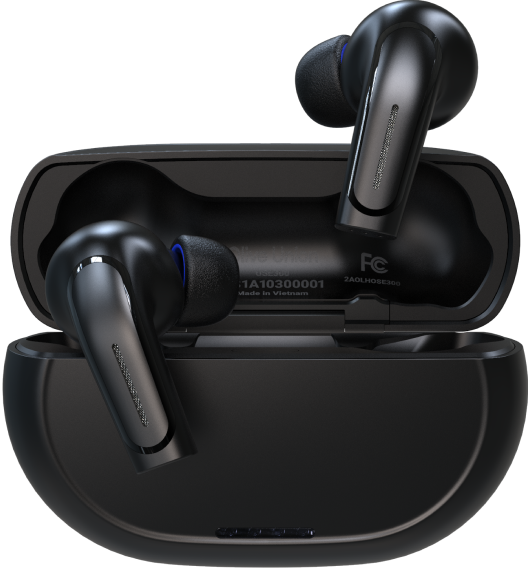
Hearing loss isn’t an old person problem. Currently, in the USA, it is more common in adults over 20 years old than ever before and is projected to double over the coming years as a result of increased exposure and proximity to loud sounds. While aging is typically the most common cause, permanent and deteriorating hearing loss can also stem from exposure to loud sounds at concerts, construction sites, headphone use - all activities we do more today than we have in the past.
In this article we will be exploring how hearing works, and how you can protect your hearing.
How Exactly Does Hearing Work?
Think of your ears as an input device like a keyboard or mouse for a computer. These devices translate actions you perform to a language a computer can interpret and react to. Your ears act as the medium between the sounds around you and your brain. As sound waves surround the ear, your eardrum and tiny bones inside your ear start to vibrate accordingly. Small receptors or hairs capture those vibrations and convert them into electrical signals that your brain can understand and register as sound.
How is Sound Measured?
You probably already have your own idea of sounds you can hear easily and those you can’t hear at all. These sounds are measured in units of decibels (dB), and while your personal hearing ID may differ, the average person with optimal and healthy hearing perceives anything over 80 dB to be loud.
The below chart shows familiar noises in dB levels - for example, a motorcycle usually produces sounds at 99~99dB!
<examples of decibel levels>

What Affects Healthy Hearing?
Your hearing health is affected by a combination of the intensity of the sounds you hear (decibel level, dB) and the duration you are being exposed to them. For example, the World Health Organization recommends that more than 4 minutes of exposure to a rock concert every 7 days can cause permanent damage to your hearing. The louder the sound, the lesser the time you should expose yourself to it. Consistent exposure over time can bring on hearing loss at an earlier age and have a tremendous impact on your physical and mental health.
How Can You Protect Your Hearing?
Even if you’ve started experiencing the early signs of hearing loss, it’s not too late to make regular adjustments to your lifestyle to address your hearing health. Try protecting your ears with earplugs or noise-canceling headphones when you’re exposed to loud sounds.
Using a hearing aid or hearing amplifier that is adjusted to your personalized needs are also a good way of protecting your hearing. This makes sure you hear each sound as you need to hear it - not too loud, not too quiet.

What are Some Early Signs of Hearing Loss?
Does any of this sound familiar to you? If so, you may be experiencing symptoms of mild~moderate hearing loss.
- It seems like people around you are whispering or mumbling.
- You are spending more time concentrating on what others are saying and looking for context clues like lip-reading, hand gestures, facial expressions, etc.
- You find yourself asking people to repeat what they just said.
- The people around you comment on how loud the TV or music is.
- People seem to be sneaking up on you.
- Family, friends, or colleagues are complaining that they have trouble hearing you or you’re too loud.
- You have increasing amounts of headaches or are experiencing more fatigue than normal.
If you are experiencing early signs of hearing loss, we recommend you try out a hearing enhancement device like the Olive Smart Ear, or see an audiologist for professional help.
Treating hearing loss from an early stage allows you to preserve your hearing better and longer.
Do I Need a Hearing Amplifier or Hearing Aid?
If you are experiencing early signs of hearing loss, don’t wait to get help! However, you don’t necessarily need to visit the audiologist just yet. Mild to moderate hearing loss can often be improved using readily available and affordable hearing solutions like the Olive Smart Ear. There is no need for an expensive and lengthy hearing exam, or wildly expensive hearing aids.
Unlike traditional hearing aids, the Olive Smart Ear is designed to be seen, not hidden - like stylish glasses but for hearing. Its form-factor resembles today’s popular wireless earbuds, eliminating any potential sign of the wearer needing hearing assistance. Millions of Americans struggle with hearing loss because they are either not ready for hearing aids or don’t want to be seen in them. Olive Union eliminates those barriers to adoption by prioritizing the antithesis of legacy hearing aid design and doing away with any hearing aid stigma.
<See the Olive Smart Ear here> https://www.oliveunion.com/products/smart-ear
If, on the other hand, you have trouble hearing someone right next to you, you may be experiencing an advanced stage of hearing loss that Olive Smart Ear doesn’t currently support and should seek medical attention from a local audiologist.

----------
For more information on the road to healthy hearing, sign up for our monthly newsletter - The Olive Branch.
 (708) 847-3208
(708) 847-3208











